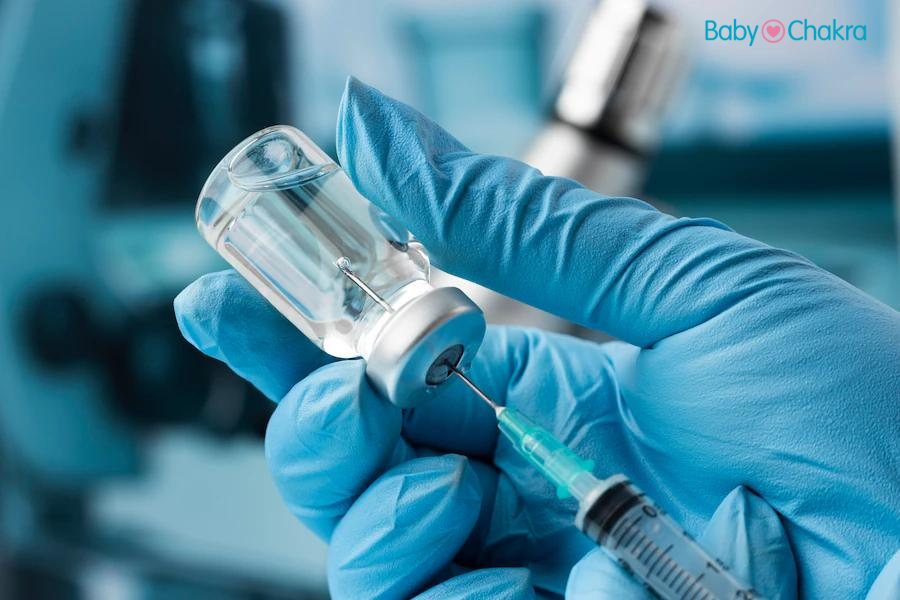
Everything Parents Need To Know About the Meningitis Vaccine
23 Jun 2022 | 4 min Read
Sayani Basu
Author | 607 Articles
Vaccines reduce your little one’s risk of infection by working with their body’s natural defences and help safely develop immunity to disease. Therefore, vaccination for babies has become an unavoidable practice.
The meningitis vaccine prevents meningococcal disease, a bacterial infection. Meningitis is a dangerous inflammation of the lining of the spinal cord and brain. Medical reports show that meningococcal disease causes meningitis in half of all cases and pneumonia in 15 percent. Mostly, children who contract the bacteria remain asymptomatic.
Symptoms are marked by their stiff neck, nausea, vomiting, sensitivity to light, and confusion. According to the Centres for Disease Control and Prevention, it has a fatality rate of 10-15% even with appropriate antibiotic treatments. Plus, the survivors are often left with serious injuries 20% suffering hearing loss, neurological damage, or loss of a limb.
Here’s everything you need to know about the meningitis vaccine.
Types Of Meningococcal Vaccines
Here are some of the types of meningococcal vaccines:
- Meningococcal polysaccharide vaccine (MPSV4)
- Meningococcal conjugate vaccine (MCV4)
- Serogroup B meningococcal vaccine
MPSV4 and MCV4 vaccines protect against the four types of meningococcal disease. An additional type of vaccine protects against serotype B that also causes meningitis.
MCV4 is preferred for people aged 55 and younger. The recommendation for teens is one dose at age 11 and the other dose at age 16.
The MenB vaccines are recommended for ages 10-24 for teens who are at an increased risk. It can also be used in older adults.
Who Needs A Meningococcal Vaccine?
The Centre for Disease Control and Prevention recommends a meningococcal vaccine for:
- All children aged from 11-18 or certain younger high-risk children.
- Anyone who has already been exposed to meningitis during an outbreak.
- Anyone travelling to a place where this disease is common (such as in sub-Saharan Africa).
- People with certain immune system disorders or a damaged or missing spleen and military recruits.
Who Should Not Get A Meningococcal Vaccine?
Your child shouldn’t get the meningococcal vaccine if he/ she:
- Has had a severe, life-threatening allergic reaction to a meningococcal vaccine in the past or to any vaccine component.
- Is moderately or severely ill.
- Has had Guillain-Barre syndrome, a rare disorder in which the body’s immune system attacks the nerves.
Expectant women can get the meningococcal shot. But it’s only recommended for expecting mums with certain immune problems.
What Are The Side Effects of Meningococcal Vaccines?
Research shows that there have been mild side effects in about half of those who get the vaccine. There might be redness or pain where the skin was injected. However, these side effects last no longer than one or two days.
Although rare, there can be serious side effects like high fever, weakness, and changes in behaviour.
Severe allergic reactions might happen within minutes or hours of having the shot. Some of the signs of an allergic reaction are:
- Trouble breathing and hoarseness or wheezing
- Hives and paleness
- Fast heartbeat, weakness and dizziness
How Does It Work?
Vaccines for meningitis are usually given as an injection into the muscle in the upper arm for teens and adults. While infants usually receive the injection in the thigh.
These vaccines contain a very tiny dose of the bacteria or parts from the bacteria and don’t cause infection. After the vaccine is delivered, the body makes antibodies against the bacteria.
Basically, vaccines train your child’s body to fight bacteria it hasn’t met yet. If he/ she later comes in contact with meningitis, these pre-existing antibodies can help protect your little one’s body.
According to the World Health Organisation (WHO), vaccination has been the most effective way of preventing meningitis and offers lasting protection. However, vaccines are not a “cure” for meningitis and doesn’t guarantee that your child won’t contract the infection. They are just an important tool to defend against the severe effects of the disease and reduce transmission.
A


Suggestions offered by doctors on BabyChakra are of advisory nature i.e., for educational and informational purposes only. Content posted on, created for, or compiled by BabyChakra is not intended or designed to replace your doctor's independent judgment about any symptom, condition, or the appropriateness or risks of a procedure or treatment for a given person.
